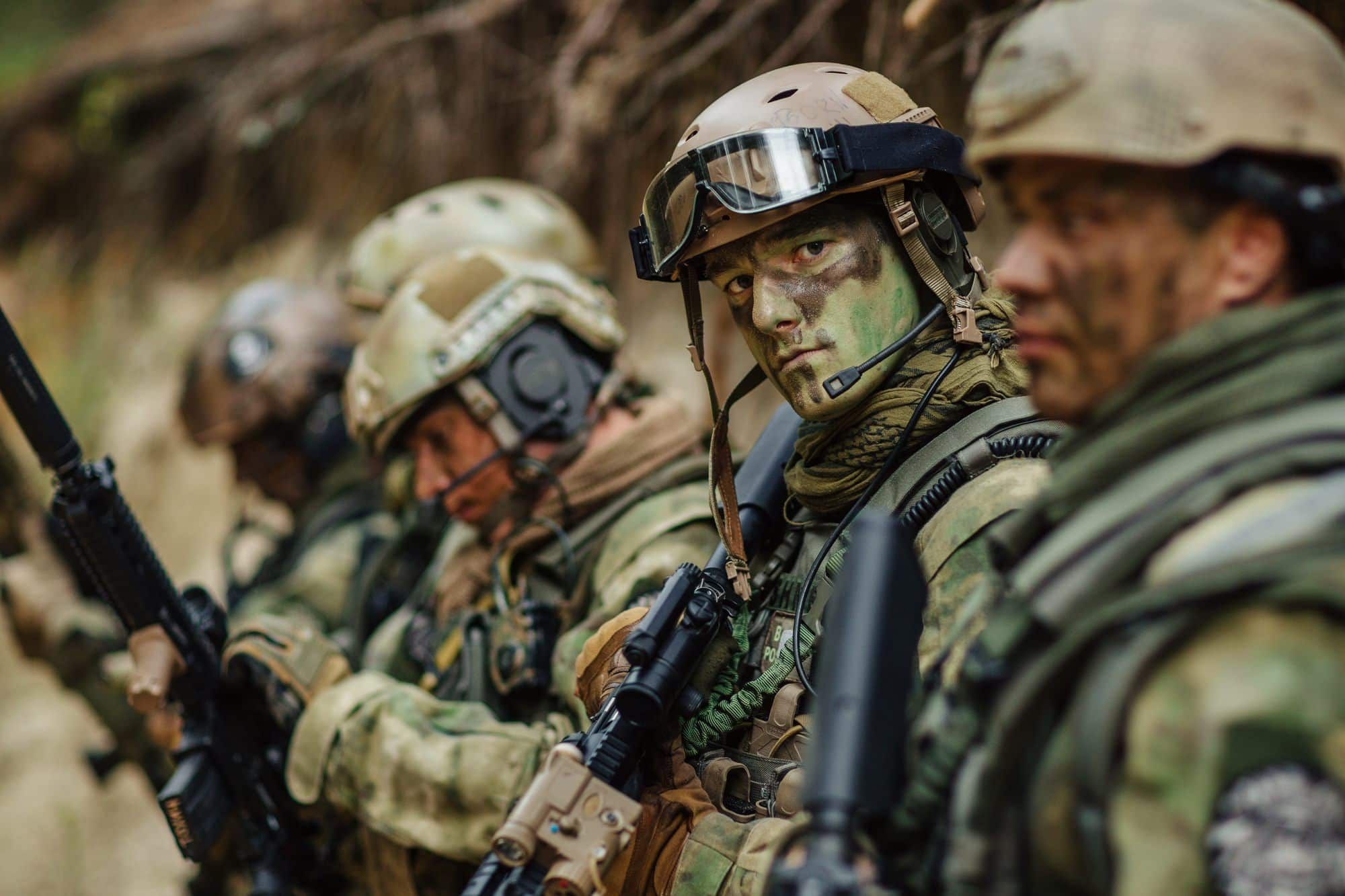
Combat earplugs are used by service members to protect their hearing in combat and training settings which may involve explosions and other loud noises.
Who Uses Combat Earplugs?
Branches of the military use earplugs to protect service members’ hearing. Explosions, heavy equipment, aircraft, tanks, gunfire, and other loud noises can quickly cause hearing damage and even complete hearing loss.
Earplugs help to prevent this damage by making noises quieter on the decibel scale. The decibel scale reflects the amount of time someone can be exposed to noise without risking damage to hearing. For every three-decibel increase in sound, the amount of time someone can be exposed to the sound is cut in half.
It can be hard to conceptualize what the decibel scale truly means. However, examples can help put these rankings in perspective. The noise of a freeway or a crowded restaurant measures around 85 decibels, meaning that an unprotected ear can be exposed to the noise for 8 hours without damage. Chainsaw noise or a loud rock concert rank higher – 115 decibels, meaning that only half a minute could result in hearing damage.
Military service members attempt to protect their hearing by wearing earplugs. Effective earplugs are able to reduce harmful noise by around 30 decibels. Unfortunately, defective earplugs may lead to unexpected hearing damage or even total hearing loss in veterans.
VA Compensation For Hearing Loss and Tinnitus
The U.S. Department of Veteran Affairs (VA) was paying out approximately $1.5 billion to over one million veterans for issues related to hearing loss and tinnitus as of 2014, according to the American Tinnitus Association. An additional 933,000 veterans receive financial assistance from the VA for hearing loss due to combat and other military factors.
Tinnitus can cause long-term problems for veterans, including depression, anxiety, mood swings, emotional distress, irritability or frustration, sleeping problems, poor concentration, and pain. Tinnitus sufferers frequently report social isolation due to their condition. In some cases, damage to the inner ear due to ineffective combat earplugs may also result in vertigo or loss of balance. Additionally, some sufferers may be unable to work due to the severity of their tinnitus.
Veterans and active-duty members who developed tinnitus or other hearing problems due to allegedly defective earplugs that were assigned to military service members may have legal options available to them to pursue compensation for damages caused by a defective product.
Allegations Against 3M and Aearo
Aearo Technologies Inc. designed the combat earplugs and secured the military contract to provide service members such protection from 2003 to 2012. When 3M bought Aearo in 2008, 3M also inherited the contract.

3M advertised the combat earplugs as “comfortable and reusable” and that the devices were able to attenuate “high-impulse noise” quickly.
Lawsuits allege 3M employees were aware as far back as the year 2000 that the earplugs did not work optimally as marketed, according to Military Times. In addition, 3M was accused of falsifying test data to make it appear the earplugs were more effective than they actually were.
Lawsuits also allege that once inserted, some service members experienced imperceptible loosening of the earplugs, which unknowingly allowed damaging sound to breach the ear canal. Depending upon the shape of the wearer’s ear, the third flange of the non-inserted side of the earplug could bend back to the device’s natural shape, which would ruin the full protection.
Even though 3M stopped making these allegedly defective earplugs that were sold to the military until 2015, the devices were never subject to an actual recall, which means some service members may still purchase them from third-party vendors.
Hearing Damage from Combat Earplugs
3M has faced legal action for allegedly selling defective combat earplugs. According to veterans, 3M and Aearo’s defective products lead to hearing loss and a condition called tinnitus due to their inability to protect service members’ hearing.
Tinnitus is the medical term for a ringing, hissing, or buzzing sound in the ears. The sound may be quiet or loud and may range from intermittent to constant. Some veterans have reported being unable to concentrate or sleep due to the sound.
Similarly, hearing loss can lead to significant issues for veterans. The disability can end up making it difficult or impossible to interact with people. This can lead to social isolation and depression.
“I didn’t know these earplugs were defective,” said Kevin Wilhelm, a Navy Veteran who says he is plagued by “nonstop” tinnitus and now wears hearing aids, which he alleges is because of these earplugs. “I thought they were the best of the best.”
Now, Wilhelm’s tinnitus causes him to sleep poorly and even to develop anxiety and depression. “You never get a moment’s rest,” he said.
Wilhelm wore ear protection throughout his 30-year naval aviation career, and switched to 3M Combat Arms earplugs in early 2003. Just four years later, his hearing became a noticeable issue, he said.
In their legal action against 3M, veterans point to a False Claims Act settlement between the company and the federal government.
More than one million veterans received disability compensation for hearing loss in 2017 alone. In 2018, 3M agreed to a $9 million settlement with the Department of Justice as well as the Army and Defense Department. The settlement resolved claims that the government was defrauded by defective earplugs sold to the army.
According to a DOJ investigation, 3M’s earplugs were too short for proper insertion into the ear. This problem with the length meant that the earplugs were prone to losing their seal with the ear. However, as losing their seal would not necessarily cause the earplugs to fall out, many military members may have been using ineffective equipment without realizing it. The defective qualities of these earplugs may have put military members at risk for hearing impairment, tinnitus, or permanent hearing loss.
Despite their federal settlement, 3M has denied any wrongdoing in lawsuits from veterans. According to the company, the product was not defectively designed. This sentiment was also reflected in the company’s statement at the time of their Department of Justice settlement.
The company stated, “settling the investigation into this discontinued product at this point allows the matter to no longer be a distraction to the business, and frees former and current 3M employees from having to go through the inconvenience of a protracted investigation and litigation.”
“We take great pride in our products and this resolution is not an admission of liability, but simply a decision to move forward with our mission to provide high quality personal safety equipment products to our customers.”
Filing a 3M Combat Earplugs Lawsuit
A growing number of veterans suffering from tinnitus, hearing loss, and other hearing issues are coming forward with allegations of defective 3M combat earplugs. Indeed, more than 200,000 people—the vast majority of which are veterans and active duty soldiers—have alleged that 3M’s Combat Arms earplugs were knowingly defective, creating one of the largest mass torts ever in the U.S., according to the Star Tribune.
If you have suffered from hearing loss issues after using 3M’s Combat Arms earplugs during training or combat duty in Iraq or Afghanistan, you may be eligible for compensation. Filing a lawsuit cannot take away the damage caused by these problems, but it can at least help to alleviate the financial burden incurred by medical expenses or lost wages.
Pursuing litigation can be a daunting prospect, so Top Class Actions has laid the groundwork for you by connecting you with an experienced attorney. Consulting an attorney can help you determine if you have a claim, navigate the complexities of litigation, and maximize your potential compensation.
ATTORNEY ADVERTISING
Top Class Actions is a Proud Member of the American Bar Association
LEGAL INFORMATION IS NOT LEGAL ADVICE
Top Class Actions Legal Statement
©2008 – 2025 Top Class Actions® LLC
Various Trademarks held by their respective owners
This website is not intended for viewing or usage by European Union citizens.
Get Help – It’s Free
Join a Free 3M Ear Plugs Class Action Lawsuit Investigation
If you qualify, an attorney will contact you to discuss the details of your potential case at no charge to you.
PLEASE NOTE: If you want to participate in this investigation, it is imperative that you reply to the law firm if they call or email you. Failing to do so may result in you not getting signed up as a client or getting you dropped as a client.












